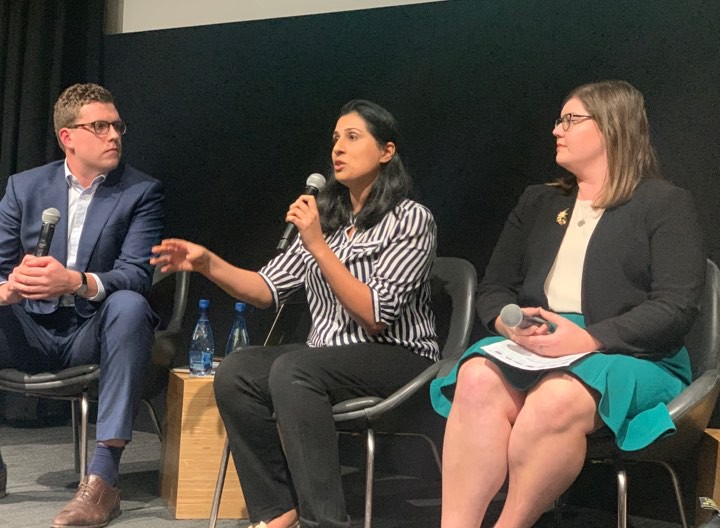By Charlie Bullis and Illias Bakalla
Media reports on domestic violence must be more conscious of supporting victims and of not absolving perpetrators, a panel of leading journalists has said.
Journalists Sarah Malik, Gina Rushton and Alison Dance shared their insights and experiences in a panel discussion at the State Library of NSW hosted by the Walkley Foundation and Our Watch — an NGO aimed at reducing violence against women and children through education.
They added that reporters properly understanding the culture of gendered violence, and reflecting that in the tone and substance of their coverage, was needed to drive a change in the public conversation.
Malik, who works for SBS, highlighted the “double whammy” challenge of reporting on gendered violence in minority communities, where women risk perpetuating negative stereotypes about their community when speaking out.
“It is a challenge to work in communities where they feel as if they are already met with suspicion, it makes it more difficult for women to talk about their stories and access the free press,” Malik said.
“For me the tension can be resolved by highlighting the strength of the survivors and seeing the story told with our own voice. I am a Muslim journalist pursuing the story and that changes the optics in a huge way, so it’s important to have diversity in the reporting community.”
When the majority of domestic abuse happens behind closed doors, often the people around the perpetrator are blind to their abuse.
Newly appointed 10 Daily reporter, Alison Dance, discussed how she factors this into her reporting.
“We had a report of horrible violence against a woman in Lithgow…we had to interview anyone that was going to talk to us, and we did get those ‘he’s a good bloke’ comments,” Dance said.

“Instead of reporting ‘the neighbours said he was a good bloke’ then including direct quotes from the neighbours, I would say, ‘speaking to the neighbours it is clear that yet again violence against women is a hidden issue.’ Straight away that has flipped the context of how I’ve used the quotes, I’ve done my job but also the job I need to do for these women.”
Buzzfeed News journalist Gina Rushton pointed out that coverage tends to “minimise violence” by focussing on the perpetrator’s drug/alcohol abuse, socioeconomic status or mental health which avoids addressing the true drivers.
“The drivers themselves are gender inequality, rigid gender stereotypes and general condoning of violence and gender-based violence,” Rushton said.
“The story is not that ‘he was an alcoholic’ so we should talk about government funding for alcohol treatments. That’s not how you frame the story, even though you kind of want to, because it’s nice to feel you have the answer for why this atrocity happened.”
The panel discussed whether gendered violence stories are being considered more “newsworthy” since the emergence of the #metoo movement.
They also shared their experiences on the journalists’ responsibility in supporting survivors, and how society expects survivors to be represented in the story.
Rushton spoke about the importance of supporting survivors from the interview right up until the story is published, making sure they understand the weight and digital record of their story.

“To us it might be 300 words in a bigger story, but for that person that’s how their story is represented and it’s incredibly meaningful,” said Rushton.
Malik added that her work, as a Muslim woman, has made her sensitive to the way she describes survivors from her community where women are already perceived as “without a voice”.
“By highlighting the strength of the female survivors and also a lot of the feminist activists within the (Muslim) communities…that changes the optics in a huge way,” she said.
Our Watch leads Australia’s work to stop violence against women and their children before it starts. The organisation was created to drive nationwide change in the practices, norms and structures that lead to violence against women and children.
If you or someone you know is impacted by sexual assault, family or domestic violence, call 1800RESPECT on 1800 737 732 or visit www.1800RESPECT.org.au. In an emergency, call 000.


